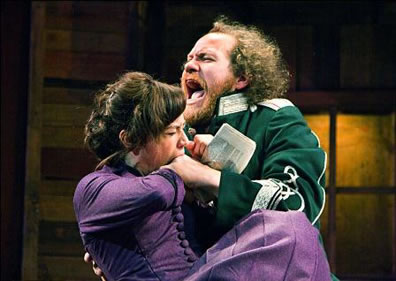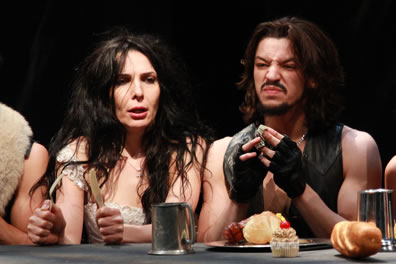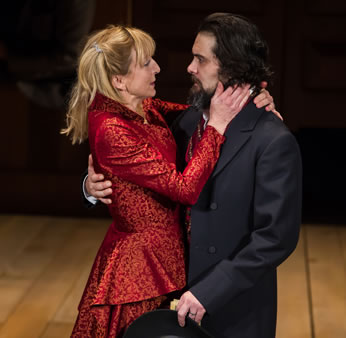On Taming Shrews
Who Is the Misogynist Monster:
Petruchio, Shakespeare, or You?
Every year we seem to see one Shakespeare play in bunches, and this year it was the time of The Taming of the Shrew. With it, came all the post-feminist consternation about the play's alleged sexist tone.
“You are such a monster!” one guy in a talk-back session after a Folger Theatre performance said to Cody Nickell, who played Petruchio. Nickell shrugged in semiagreement, but nearer to us another man asked, “Is he really, though?” He asked too quietly for many others to hear because, you see, those of us who don't see this as a blatantly sexist play and who have a measure of respect for Petruchio tend to sit by meekly abiding the unameliorated tide of feminist furor.
I've noticed, though, that most of that furor and the denigration of this play as Shakespeare at his most misogynistic comes from men. Perhaps they are taking to heart George Bernard Shaw's comment that no man “with any decency of feeling” could watch the play's last scene in the company of a woman “without feeling extremely ashamed.” Or perhaps these guys are just trying to build their own sensitive-man cred. But they and Shaw and many directors fail to grasp Shakespeare's own feminist side in this play and beyond. And let me be clear here: By “Shakespeare's feminist side,” I don't apply an ironic reading to The Taming of the Shrew. Shakespeare unabashedly wrote a play about a macho Petruchio successfully "taming" a shrewish Kate. But through that device he also presents the portrayal of a relationship built on trust, “built” being the operative word. In fact, Petruchio is the only man in this play who gets women (and, consequently, got the woman, heart and all).
All you Mr. Sensitives might as well stop reading now and tag me as a Neanderthal lout. The rest of you, remember that I've been married 20 years to a woman who attained the rank of colonel in the Air Force, so hear me out.
It's easy to dismiss The Taming of the Shrew—and Shakespeare's frame of mind upon its writing—as one of his earliest works (therefore, he was immature) or to regard it as simply a farce performed as a joke for a drunk tinker (therefore, it has no intentional substance). Even if both counts are true, they miss the point. On the latter, the theme of a husband's domination over his wife is touched on in the Induction (where Sly, the drunk tinker, is featured and is in no way meant to be a role model). On the first point, not only is Shrew one of Shakespeare's earliest plays, I adhere to the scholarship that places it as his very first play. Its poetry is simple and formulaic and the characters all stock figures—except, perhaps, Kate and Petruchio. This seems the work of a clever someone launching his career on the firm footing of a tried formula.
The Taming of the Shrew also launches Shakespeare's career-long study of relationships, especially male-female romantic relationships. The battle of the sexes, as this play so often gets tagged, is carried out specifically in two more comedies: Much Ado About Nothing in mid-career and All's Well That Ends Well in later career. Put them together, and you have an arc: In Shrew the man manipulates the woman to his will; in Much Ado, Beatrice and Benedick pretty much end in a draw (we could subtitle it “The Taming of Two Shrews”); in All's Well, the woman manipulates the man to her will (i.e., “The Taming of the Jerk”). I'd love to see a theater run these three plays in repertoire, the same two actors playing the battling male and female leads, and I bet we'd see some common themes emerge. Meanwhile, I can already hear the chatter from people who would declare that this arc merely indicates that Shakespeare grew wiser as he grew older.
So, back to Shrew and a closer look at the lines and circumstances within that play. I find it ironic that modern audiences call Petruchio the monster and Kate the victim. Really? Have you listened to this woman? She insults everybody. Even when she meets someone for the first time, her first comment is a put-down. She might be fun to watch on Bravo, but would you want to marry her? Or if you did marry her, how long before you would want to “curb her mad and headstrong humor” that inspires her incessant hissy fits? Furthermore, Shakespeare doesn't give us testimony before we see her—she appears in the first scene and immediately threatens to “comb [Hortensio's] noddle with a three-legged stool.” Oh, poor Kate.
This is a woman engaging in antisocial behavior by any definition and no matter the motivation. Meet her and tell me you would marry her, you would hire her or work for her, or you would want her as your friend.
Petruchio, of course, wants to marry her, but primarily for her dad's wealth. Absolutely he's a sexist dude and sees a wife as a means for economic advancement. In that regard he's no different from any of the other men in this or many other Shakespeare plays—even Lucentio: he is smitten with Bianca's beauty, perhaps, but that beauty is an obvious manifestation of her wealth. Petruchio is simply bolder and more impetuous than the other men in achieving his intentions. Misogynist, though? The play would prove this not so. He tells us beforehand he will woo her by layering on the compliments, and he starts out doing that but soon finds himself in a wit-battle with Kate. Unlike the other men, he engages her wit and even appreciates it. Kate is obviously the most intelligent individual in this play, and only Petruchio respects that fact.
Does he fall in love with her at first sight or, at least, in that first meeting? Every production I've seen has him doing so. I don't read this in the text, though admiration certainly is there, but he is obviously entirely in love with her by play's end. After Kate passes the first trial of obedience at the wedding banquet and leaves to fetch the other women, Hortensio says “I wonder what it bodes.” “Marry, peace it bodes,” replies Petruchio, “and love, and quiet life; an awful rule and right supremacy, and, to be short, what not that's sweet and happy.” Seems to me, from what we've seen of Petruchio in the first couple acts, that a quiet home life was not his ultimate goal: It was get the bride, control her money, lock her away except when you need to show her off, and hang out at the club and brothels. But, no, Petruchio desires a home life to share with Kate. “Awful rule and right supremecy” sounds sexist, and may be ("awful," by the way, means commanding due respect); after all, he speaks this to the other men in the room and at least sounds like a display of machismo. But pointedly, these lines have no gender, nor does "awful rule and right supremecy" specifically mean him. To be sure, Petruchio does tell us earlier after taking Kate home that “thus have I politicly begun my reign,” but the word “politicly” is not only a telling inclusion but makes for an unmetrical line, a signal of significance for the actor.
Because of Petruchio's “wive it wealthily” comment back at the beginning of the play, some people believe he sees Kate as his property, and cite his speech in the wedding scene as further evidence. But that speech expressly illustrates he does not see her as property. He seems to equate her to his possessions, but at the end of his inventory of goods, chattels, house, household-stuff, field, barn, horse, ox, and ass, he says, “She is my anything,” a possession equal in value to any and all he has. Really, her wealth as offered by Baptista does not amount to all that, so in a riddling way he now seems to be professing he sees more in her than property value.

The meeting: Maggie Siff as Kate and Andy Grotelueschen as Petrruchio in the Theatre for a New Audience production of The Taming of the Shrew at The Duke on 42nd Street in New York. Photo by Henry Grossman, Theatre for a New Audience.
Before we come to the significance of Kate's final speech on obedience, we need to track the true purpose of Petruchio's taming her. I can't defend his methods of food and sleep deprivation (methods of enforced cooperation that these days are banned by international laws) except to point out that he specifically tells us he is going to use the method by which hawks are trained in the sport of hawking; and, well, that's cruel to hawks, too. But let's be clear that he doesn't visit any violence on her (the only time he threatens to do so is after she strikes him), and if he were such a monster his methodology could have been far more abusive.
Let's instead turn to the lesson he wants to impart on Kate. He realizes from the beginning that intelligent and spirited though she may be, she has no respect for him or anyone else. Is she a spoiled brat starved for her father's love as the Theatre for a New Audience portrayed her this year? Is she grieving the loss of her mother and is a product of a wealthy society's excesses as Synetic portrayed her this year? Is she a tomboy hellcat as Folger portrayed her this year? Whatever backstory you want to give her, the bottom line in the text is she is selfish and has an utter disregard for others. It is Kate herself who reveals this trait: she “who never knew how to entreat, nor never needed that I should entreat.” Starting with the wedding—he arrives late, he dresses in wild apparel—Petruchio throws utter disregard right back at her. Once at his home, he displays the trait to his servants and the tailor while reversing course in his behavior toward her by going to the extremes of utter regard, depriving her of food and sleep “under name of perfect love.”
Once he establishes this bottom line, Petruchio begins to build their relationship step by step. He starts with regard, offering her a meal he prepared himself, but taking it away until she finally deigns, for the first time in her life, perhaps, to say “thank you.” He then moves to respect. After dismissing the tailor, Petruchio gives a wonderful speech about personhood: “Our purses shall be proud, our garments poor, for 'tis the mind that makes the body rich, and as the sun breaks through the darkest clouds, so honor peereth in the meanest habit.” Note his use of the first-person plural: He is talking about himself as much as her.

The taming: Irina Tsikurishvili as Kate and Ryan Sellers as Petruchio in Synetic Theater's The Taming of the Shrew at the Lansburgh Theatre in Washington, D.C. Petruchio and his feasting friends kept Kate from getting any food in this all-dance production of the play. Photo by Johnny Shryock, Synetic Theater.
His final lesson is trust. Shakespeare is brilliantly subtle in the way he unspools this lesson, because it looks as if Petruchio is the obstinate lunatic when, in fact, he is building up for a payoff, figuratively at first, literally in the end. First he insists that the time will be what he says it is, regardless of the clock. Then he insists that the sun will be the moon and the moon will be the sun if that is his desire. “Look what I speak, or do, or think to do, you are still crossing it,” he says. This sounds like despotism, especially as it's Hortensio who observes that “this gallant will command the sun.” But Petruchio's true motive becomes clear after Kate finally gives in and he puts her to a very public test: Greeting Vincentio as a young mistress. Does Petruchio humiliate Kate in this sequence? Say yes and admit that he humiliates himself first, for he opens by greeting Vincentio as a maiden before he gets Kate to do the same. When she follows him, he reverses, forcing her to admit her mistake, too (getting a sly dig in at Petruchio as she does so). Ater Petruchio quickly assuages Vincentio from feeling any insult, something magical happens in the context of this play: Vincentio calls Kate “my merry mistress.” This is the first person other than Petruchio to pay Kate a compliment, to not see her as a curst shrew. Given what we've seen of Kate to this point, that has to have a huge impact on her.
Thus we come to the wedding banquet and the wager over which wife is most obedient. For modern audiences, commentators, and some directors, this is Kate's crowning embarrassment. But they haven't been paying close attention to the journey she's taken. They also are giving Kate as little respect as they claim Petruchio has for her; after all, he has enough confidence in her to say of the 20 crowns offered in the wager, “I'll venture so much of my hawk or hound, but twenty times so much upon my wife.” (Are you noticing that Petruchio phrases things so that they sound one way but could actually mean something altogether different? He's politic indeed.)
A key moment in the scene comes right before the test of obedience when the Widow insults Kate. As Kate is a woman who not only has constantly threatened violence on people but has hogtied and attacked her sister, slapped Petruchio, and teed off on Hortensio's head with a lute, you can sense what might be coming when she responds to the Widow with the line, “And I am mean indeed respecting you.” But the altercation seems to be cut off when Petruchio and then Hortensio start encouraging their wives on. This can lead to different stage interpretations, from the wives showing disgust at their men to the wives engaging in fisticuffs, but Shakespeare himself gives no guidance in the way of stage direction. Shortly thereafter, the two women along with Bianca leave together, apparently in a sense of sisterhood.

The mating: Kate Eastwood Norris as Kate and Cody Nickell as Petruchio in the Folger Theatre production of The Taming of the Shrew in Washington, D.C. In this Wild West-set version, Kate starts off as a Calamity Jane-type, gun-toting wildcat. Photo by Jeff Malet, Folger Theatre.
Let's follow them offstage and, instead of watching the men send for their wives, let's watch the wives by the parlor fire being sent for. Biondello comes in and reports that Lucentio has sent for Bianca. She's already peeved and says no. Biondello returns, but this time he says Hortensio entreats his wife to come to him. The Widow retorts that her husband probably has “some goodly jest in hand” and sends Biondello back with an order to send Hortensio to her. Kate, the most intelligent person in the play, remember, will catch on to the Widow's assessment, especially when Grumio shows up and tells her that Petruchio commands her presence. She knows he's up to something, and she has to figure there is a payoff worth pursuing. Of course she's going to go to him. This isn't mere obedience; this is common sense in a woman who has come to trust her husband.
The payoff is bigger than she could have anticipated, far beyond seeing all the money in the wager. Petruchio orders her to retrieve Bianca and the Widow, and if they don't come “Swinge me them soundly forth.” Kate has just been given public license to get even with the sister who has been a thorn in her side and the Widow who just insulted her. That's a duty she'll willingly do. As Kate retrieves the other two women, Petruchio brags to the other guys in the room how he'll further show off his wife's obedience.
And what is the most humiliating thing he comes up with? He orders Kate to throw her cap underfoot, but he adds a qualifier: It “becomes you not,” he says. Let the Widow and Bianca be shocked, let the men be impressed. Meantime, Kate and Petruchio play out a shared history the others (except maybe Hortensio) know nothing of. This, after all, is Petruchio saying it “becomes you not,” he who arrived at their wedding in eccentric clothes, who talked of poor garments but rich minds. If this is not a statement of validation for her true personhood, then it is, at least, an inside joke. Indeed, the cap could be the mean one she had to wear after he sent the tailor off. Given what they know—and what the audience knows—the Widow and Bianca are cast in an ironic light when the former protests that she will never " be brought to such a silly pass” and the latter cries, “Fie, what a foolish duty call you this?”
Taken out of this context, Kate's speech on obedience given on Petruchio's command, has reason to rile up Shaw and others. However, consider not just the context of the scene (Petruchio specifically wants her to set herself above the other women who for so long had been placed above her), but also the context of Shakespeare's time. This speech draws heavily from Paul's letter to the Corinthians on the place of women in a marriage. Though priests and ministers try to explain away the inherent sexism of these verses as an allegory for man's relationship to the church and God, this passage of Scripture has been generally banned by women in their weddings. In Shakespeare's time, it was dogma; he's not going to undermine it. Yet Shakespeare nevertheless has Kate expound as well on the husband's duty to the wife and expressly refers to a relationship built on the husband's “honest will.” As Cody Nickell pointed out in the talk-back at the Folger, if you remove the gender in this speech, it is a solid piece of counsel on relationships. It is here spoken by Kate regarding Petruchio, and it could just as easily be spoken by a man regarding his Air Force colonel wife.
That is the lesson of this play, one that Shakespeare would revisit in Much Ado and, in a more obtuse way, in All's Well: Regard is the duty of all men and women, respect is a necessity for one to truly love another, and trust is the foundation of a rich relationship. Call it misogyny, call it feminism. I call it Shakespearean truth. That may be the real monster in this play, since so many people, especially Mr. Sensitives, seem to be afraid of it.
Eric Minton
June 12, 2012
Comment: e-mail editorial@shakespeareances.com
Start a discussion in the Bardroom



 Find additional Shakespeareances
Find additional Shakespeareances